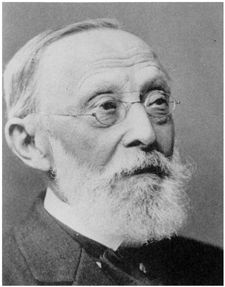 Rudolph Virchow was a pathologist that developed the cell theory and applied it to explain the causes of diseases. Rudolph Virchow was a pathologist that developed the cell theory and applied it to explain the causes of diseases.
Rudolph Ludwig Carl Virchow was born on october 13, 1821, in Schivelbein (Pomerania). He studied medicine in Berlin, where was very influenced by his teacher Johannes Peter Müller. He received his medical degree in 1843.
Virchow's contributions to medicine were impressive. In a very brief summary:
- He corrected and extended the cell theory of Schwann and Schleiden, showing that cells are the fundamental unit of life and that cells arise only from other cells (“omnis cellula ex cellula”).
- He rejected the ancient idea that disease was an affliction of the entire body or of one of its humors. Disease, set Virchow, was the result of a cellular alteration.
- In his book “Die CellularPathologie” (Cellular Pathology) he enuncied the principles on wich medical research would be based in the next 100 years, founding the modern clinical medicine.
- He made importants contributions to the knowledge of processes as Blood coagulation, Atherosclerosis, Leukaemia and other Cancer diseases.
Virchow was not only dedicated to biology and medicine. He was also actively engaged in social, political and archeological affairs. For example, he entered the Reichstag, he promoted “democracy, education, freedom and prosperity” and he collaborated with Schliemann in the excavation of Troy.
Virchow continued working until he was 81. He died in Berlin on September 15, 1902.
More information:
|
 Rudolph Virchow was a pathologist that developed the cell theory and applied it to explain the causes of diseases.
Rudolph Virchow was a pathologist that developed the cell theory and applied it to explain the causes of diseases.